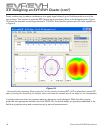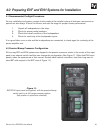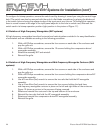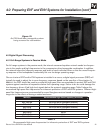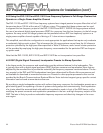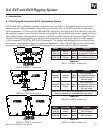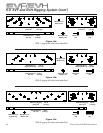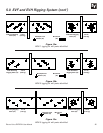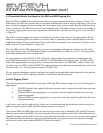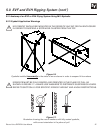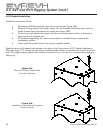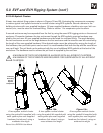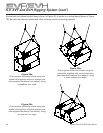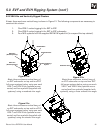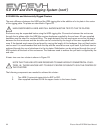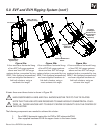
Electro-Voice EVF/EVH User Manual26
5.12 Important Details that Apply to the VRK and HRK Rigging Kits
Both the VRK and HRK kits include all necessary mounting hardware (as shown in Figures 14 and 15).
Additionally, the VRK kits include a set of low-profile stabilizer bars to both simplify alignment of the enclo-
sures during the rigging process and keep the front edges of the systems neatly aligned. Additional hard-
ware is included in the VRK kits to mount these stabilizer bars. The stabilizer bars mount to the insides of
the vertical rigging plates for a clean appearance. Stabilizer bars can be seen in Figure 14 and, installed,
in Figure 21.
The HRK horizontal rigging kits have a tie plate that is welded to the center of the rigging plate. This tie
plate is for suspending the top systems in a cluster and for suspending lower systems below (with user-
supplied hardware). It has six holes that fit a standard 5/8-inch shackle (user supplied). Tie plates can be
seen in Figure 15 and, installed, in Figure 22.
Both the VRK and the HRK rigging plates use arrow designators and a series of letters by each of the
mounting holes to ensure that the desired angle is achieved. Refer to Tables 5, 6, and 7 for a description
of the appropriate arrow direction and letter.
All rigging plates except the EVF-to-EVF-subwoofer rigging plates are symmetrical, meaning that the
mounting-hole layouts are the same from the left to the right sides of the rigging plate. The EVF-to-EVF-
subwoofer rigging plates are asymmetrical, meaning that one side is for subwoofers, labeled “Sub,” and
the other side is for EVF’s, labeled “EVF.” This rigging plate must be flipped over depending on which side
the subwoofer is on. This asymmetry is shown in Figure 15b.
All user-supplied hardware must be overhead load-rated (using applicable safety factors) for the specific
cluster. See section 6.0 for additional details on load limits and safety factors.
5.2 EV-I Rigging Primer
The following sections describe the clustering of EVF and EVH systems using one of the following three
approaches:
1. EVI-M10K eyebolt kits supplied with each system (used in conjunction with other user-sup-
plied hardware).
2. Optional VRK vertical rigging kits, in conjunction with the supplied eyebolt kits and user-
supplied hardware.
3. Optional HRK horizontal rigging kits, in conjunction with the supplied eyebolt kits and user-
supplied hardware.
In all cases, note that the weight of the cluster can be substantial and the building structure must be ca-
pable of supporting the weight. (System weights are given in Figure 1.)
The optional VRK and HRK rigging kits are the most convenient way to assemble EVF and EVH clusters,
offering a great deal of flexibility in box aiming angles. Using the supplied eyebolt kits with additional user-
supplied hardware is more difficult, but does allow the most flexibility, since not only can box aiming angles
be determined but also the boxes can be rotated about their aiming axes, which can improve coverage
uniformity in certain venue shapes (EASE 4.2 allows this option).
5.0 EVF and EVH Rigging System (cont’)



